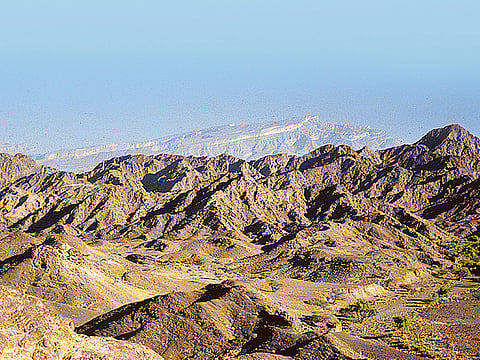Oman rocks to help fight global warming?
When peridotite rock reacts with carbon dioxide it converts gas into solid

Muscat: A professor in Oman has come up with a discovery that promises a breakthrough solution to the issue of carbon emissions on a global level: a rock commonly found just under the crust of the earth could soak up the planet’s entire carbon dioxide emissions, even without being mined.
Subhi Nasr, Director of Earth Science Research Centre at Sultan Qaboos University, says that when the peridotite rock — made up mostly of silicate minerals olivine and pyroxene — reacts with carbon dioxide, it converts the gas into calcite, a solid mineral.
This interaction only requires that holes be drilled into the peridotite rock.
Oman is one of the few places where the rock appears on the earth’s surface. It also boasts the largest such rock formation in the world stretching more than 600 kilometres, with a width of 150 kilometres and a depth of 3 kilometres.
“Peroditite absorbs 100,000 tons of carbon dioxide every year in Oman,” Khalid Al Hashmi, a geologist, told Gulf News.
Peridotite can also be found in the Pacific islands of Papua New Guinea and Caledonia, and along the coast of the Adriatic Sea and in smaller masses in California.
In 2012, Dutch companies contacted the university to supply the rocks in powdered form to the Netherlands, but that plan did not work out because of the high cost of transporting the material from Oman to the Netherlands as well as the high cost of insurance.
Subhi says the discovery could help reduce the world’s carbon dioxide emissions drastically and reduce global warming.
“Global warming is extremely worrying and it is growing every year,” he told the Atheer news site.
“There is a dramatic increase in global temperatures and a rise in sea levels in most areas, including Oman,” he said.
Sultan Qaboos University initially commissioned the research project in 2006 with over 70 scientists and geologists involved.
To absorb the carbon dioxide, the scientists propose to liquefy the carbon dioxide from gas-exporting plants and pump it through wells drilled into the rock.
They also propose to grind the peridotite rock and mix it with the liquefied carbon dioxide. “The process needs more research as drilling operations are very costly,” Al Hashmi said. “But its still a lot cheaper and safer compared to other methods such as converting carbon dioxide into coal and storing that underground,” he added.
“Scattering the rock’s powder in marine areas could help preserve coral reefs,” Subhi explained.
Subhi says that Oman is studying ways to export peridotite rock powder in the future, which could potentially bring in enormous profits.
Subhi explained that the team will start drilling operations soon in wadis in Dima wa Tayeen and Mudhaibi provinces to expand the trials.
Sign up for the Daily Briefing
Get the latest news and updates straight to your inbox



